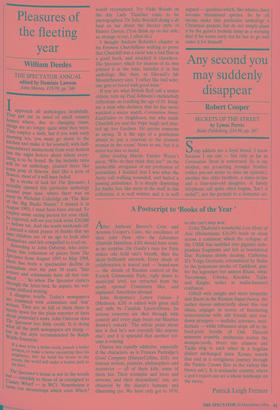Pleasures of the fleeting year
William Deedes
THE SPECTATOR ANNUAL edited by Dominic Lawson John Murray, £19.99, pp. 246 Iapproach all anthologies doubtfully. They put me in mind of small country houses where, due to changing times, things are no longer quite what they were. They employ a daily, but if you want early 111°roing tea, you must go down to the kitchen and make it for yourself, with half- remembered instructions from your hostess late the night before about where every- thing is to be found. By the bedside table Will be an anthology, planted there like some Posy of flowers. And like a posy of flowers, most of it will have faded. By a stroke of luck for The Spectator, I moodily opened this particular anthology around page nine, where there was an essay by Nicholas Coleridge on 'The Rise of the Big Bucks Nanny.' I missed it in August 1993; I must have been abroad. To employ some caring person for your child, he reported, will set you back some £30,000 — before tax. And she wants weekends off. I uttered a silent prayer of thanks that my own children are of an age to look after themselves, and felt compelled to read on. A According to John Osborne, who intro- duces this collection of pieces from The Spectator from August 1993 to May 1994, there has been a spectacular decline in Journalism over the past 30 years. 'Star writers and columnists have all but van- ished . • • ' So when The Spectator clatters through the letter-box, he argues, we wel- come civilised writing. I disagree totally. Today's newspapers are crammed with columnists and 'star' writers. They are so full of them there is barely space for the plain reporter of facts about yesterday's news. John Osborne does The Spectator too little credit. It is doing but all the posh newspapers are doing ___ but n the style recommended by Ralph Waldo Emerson:
If a man write a better book, preach a better sermon, or make a better mousetrap than his neighbour, tho' he build his house in the woods, the world will make a beaten path to his door.
. The Spectator's house is not in the woods but — enviably to those of us consigned to Canary Wharf — in WC1. Nonetheless it turns out mousetraps which even Which? would recommend. Try Vicki Woods on the day Lady Thatcher came to be photographed. Or Julie Burchlll doing a de haut en bas about the literary style of Hunter Davies. (You finish up on her side, as, strange to say, I often do.) I thought Andrew Roberts's chapter in his Eminent Churchillians seeking to prove that Churchill was a racist was a bad flaw in a good book, and attacked it elsewhere. The Spectator, which for reasons of its own printed it at the time, includes it in this anthology. But then, as Disraeli's Mr Mountchesney says, 'I rather like bad wine, one gets so bored with good wine.'
If you are what British Rail call a senior citizen, turn up Paul Johnson's melancholy reflections on reaching the age of 65. Imag- ine a man who declares that he has never watched a soccer match, Coronation Street, EastEnders or Neighbours, but who made Churchill cry and the Pope laugh and chat- ted up Ava Gardner. He quotes someone as saying, 'It is the sign of a gentleman always to pay a courtesy to the plainest woman in the room.' News to me, but it is never too late to mend.
After reading Martin Vander Weyer's piece, 'Who do they think they are?' on the intolerable arrogance of my profession of journalism, I decided that I was what the Army call walking wounded, and hailed a passing ambulance. It is deeply dispiriting for hacks; but, like most of the stuff in this collection, it is well written and it is well argued — qualities which, like whales, have become threatened species. So by all means make this particular anthology a Christmas present, but do not simply plant it by the guest's bedside lamp as a warning that if he wants early tea he has to go and make it for himself.


































































 Previous page
Previous page